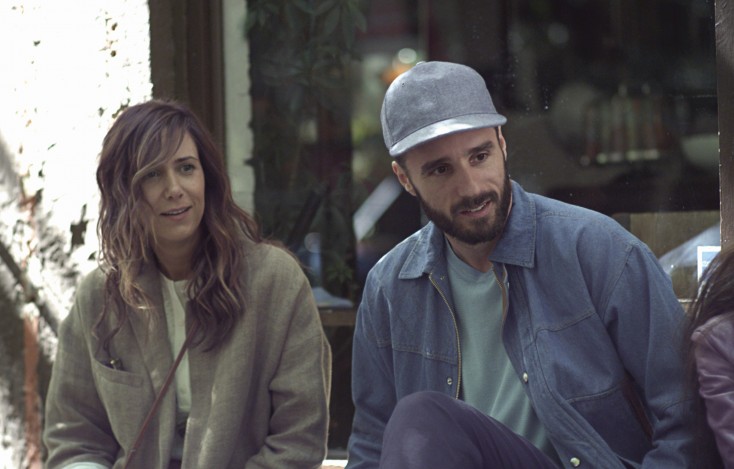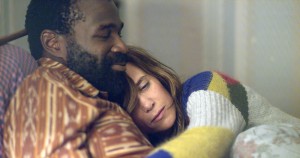By ANGELA DAWSON
Front Row Features
HOLLYWOOD—Kristen Wiig is best known for the wacky characters she played as a cast member for eight years on “Saturday Night Live,” as well as the goofballs she has played on the big screen in comedies like ‘Knocked Up,” “Bridesmaids” and “The Heat.” Of late, though, the New York native has bolstered her acting cred in dramas including “The Skeleton Twins” and “The Martian.”
The Oscar nominated actress—for co-writing “Bridesmaids”—once again gets real in the small, independent drama “Nasty Baby.” Written and directed by Chilean filmmaker Sebastian Silva, who also stars in the film alongside Tunde Adebimpe and Wiig, the film explores gentrification and gay parenthood. Silva and Adebimpe play a gay Brooklyn couple that asks their friend, Polly (Wiig), to serve as a surrogate in their desire to have a baby. The story was inspired by events in Silva’s own life.
Wiig learned of the role from her friend Alia Shawkat, an actress and co-producer on the film who introduced her to Silva, best known for his quirky 2013 drama “Crystal Fairy & the Magical Cactus” that starred Michael Cera and Gaby Hoffman.
“I just talked to Sebastian on the phone, and I just knew,” recalls the actress during an interview.
Silva reveals that he didn’t know who Wiig was when Shawkat suggested her for the role.
“When we met, I started tickling her and she agreed to do it,” he says with a laugh. “It was a tickle attack that made her want to do (this movie).”
Q: How does this film reflect society today?
Wiig: There are a lot more gay parents. There are people trying to have kids in different ways, and it’s a wonderful thing.
Q: What’s the difference in making a film like this and doing a big budget film like “The Heat?”
Wiig: I feel like I’ve done more small films, and there’s definitely a different energy on the set when you have those resources. On this, we shot so much in one day. We really didn’t have craft services (caterers). It was more of a table with pretzels, which was fine. There’s something great about both of them. Doing a movie like this, you really feel like you’re just running around Brooklyn with a camera making a movie and it feels important and fun. I love that. But there’s also something great about making something bigger. When you’re on the set, you’re just in that moment and you adapt to where you are. I don’t say, “I like this one better or I don’t like this because…” I really do love making small films.
Q: Shooting on the streets in Brooklyn, how did the locals respond to you?
Wiig: We’d hide from them. (She laughs.) We had a small crew so no one really noticed us.
Q: Where does the title come from?
Wiig: Sebastian had come up with this title about 16 years ago for a performance piece in which he rolled around on the floor. So, on the first day of shooting, we all had to do that. It’s really embarrassing, even by yourself. People are watching you rolling around on the floor acting like a baby. But we did it all together, so it was fun.
Q: How was it working with Sebastian?
Wiig: It didn’t seem like work. When we talked on the phone before we started, it was like we’d known each other forever. We instantly became friends. We played close friends in the movie, and so much of it was improvised. It was very inspiring to watch him work.
Q: How did you like working with the hand-held cameras? Did you find it freeing?
Wiig: Yes. There weren’t a lot of marks.
Q: You come from an improv world. Do you enjoy having that aspect when you do a film like this? Do you mark up the script to note what you want to get in a scene?
Wiig: Yeah, but that’s more Sebastian than me. There was a full outline to the script. Before we would do the scene, we would talk about what needed to happen and where everyone was coming from. We didn’t talk about specific dialogue, but what had to happen in the scene. I’d never done improv in a dramatic sense before. I was actually a little nervous about it because I was unsure how that was going to go.
Q: Is a different approach to the comedic moments in this film to what you did on “Saturday Night Live” or the broad comedic films you’ve done?
Wiig: A lot of the comedic stuff that happens in the film just happened organically because Sebastian and I were really silly with each other. We had a light relationship because it takes a darker turn later (in the film). There’s always that fine line. You never know if they want something to be funny or they expect it to be funny because I have a comedic background. For this, it was mostly serious. Those little light moments just happened.
People talk about how this film has a big turn, but that’s what happens. Whenever you have something bad happen, you could have been having a great morning.
Q: How do you choose your roles? Do you have a different process when you’re drama versus comedy?
Wiig: I don’t know if I have a specific process. Each role is different. It depends on what I’m doing and if I have a script. Usually, I spend a lot of time talking with the director and figuring it out, like I did with Sebastian. But every project is so different. This was a dramatic role and my part was pretty big. I had an arc and I had to change. So I just spent a lot of time talking to Sebastian, who also is the writer of this.
Q: What happens with Freddy, Mo and Polly after the end of the movie?
Wiig: I don’t like to say because I think people have their own opinions about it. Mine’s probably different from Sebastian or other people’s. I leave it up to the viewer.
Q: Is there a memorable moment for you in this movie?
Wiig: A scene not in the movie when I’m riding the scooter behind the car. It was the middle of the night and they were filming me.
Q: Why should audiences see this?
Wiig: People want to see different stories. It’s real. It’s a great story. It’s a different kind of film. Why wouldn’t people want to see it?
Q: Do you miss television? What’s your perspective on your influence on other comedic actresses like Amy Schumer?
Wiig: It’s hard to reflect on yourself. I miss “SNL” a lot. Still. I just went back for the first show. I still get that little pang of not being in that group anymore. I do really miss it. I miss being in New York, and being on that show.
I think Amy Schumer is so amazing. It’s exciting for me to see this happening and that “Trainwreck” did so well. It’s hard to comment on it because I’m always asked that “women in comedy” question and “How is it different now than it was back then?” I feel like I’m always going to be asked that so if I’m always asked the question then I’m saying that it’s still a struggle, and it’s different. But, yeah, there are a lot more roles for men. That’s just the way the business is, and it’s always been that way. I do think it’s getting better but I also think we have a way to go. Comedy is changing fast. A lot of big names in comedy are women and that’s amazing. It’s hard for me to see how I fit into the picture.






